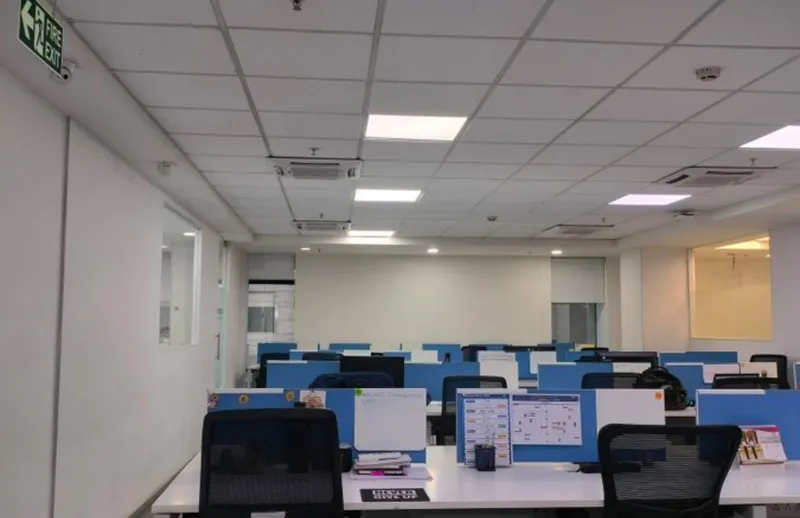Lonely Desk in Bangalore sparks work-life balance debate
An empty co-working space in Bangalore has fueled the work-life balance debate yet again. But do Indians need to push out 70 hours per week for the nation's growth?
Bangalore is not for beginners! Earlier this year, a video made the rounds online showing a man multitasking by attending a meeting on his laptop while riding a scooter through the streets of Bangalore. Not to be outdone, another incident in the city captured a woman shopping for shoes while in a work meeting.
While these hilarious incidents are what peak Bangalore moments are all about, it raises an important question- do Indians have a good work-life balance? An empty co-working space in Bangalore recently gained attention on X, highlighting the issue.
More importantly, does India need a 70-hour work week or an "obsessive work culture" to beat other nations? Let's decode this.
Why did an empty co-working space go viral?

Credit: Sagar Lele
An X (previously Twitter) post shared by Sagar Lele on 18th June went viral with 5 lakh+ views and more than 1,000 likes. This man from Bangalore called out on workers leaving their offices early which has sparked a debate on work-life balance.
His post read "There was a time when I'd have to reach the office at 7 am and leave at 2 am for me to be the first to reach and last to leave. This is a co-working space in Bangalore at 6:30 pm. Shame," Many X users disagreed with this post saying putting more than 8 hours in the office is unproductive.
The commentary and the ensuing debate pose a question about India's work environment and productivity.
Are Indians overworked and underpaid?
The UKG Workforce Institute recently conducted a study which found that 78% of employees in India experience some form of job burnout. Last year, The McKinsey Health Institute's 2023 survey reported similar data, suggesting that workplace exhaustion among Indians was at 62%. This survey also revealed that younger employees between the ages of 18 and 24 suffered more burnout symptoms.
The statistics are not surprising, as Indians spend the majority of their time working and traveling. In urban areas, employees often have very busy lives, working more than 8-10 hours a day, which disrupts their personal and family time. However, urban unemployment has risen to 6.7%, according to the Periodic Labour Force Survey in the March quarter. This indicates that companies are short of manpower in offices after layoffs and the current staff is facing the pressure of handling the tasks of those who were shown the pink slip.
But more work seems only reasonable if the compensation is attractive. A survey conducted by ADP Research Institute showed that 69% of Indian employees feel they are underpaid. This could be part of the reason why Indians do not feel motivated to put in extra hours at their workplace.
Is a 70-hour work week going to boost the economy?
Infosys co-founder N.R. Narayana Murthy's 70 hours per week gave rise to a national-level debate. He added that "India's work productivity is one of the lowest in the world" which is why he wanted youngsters to work 70 hours a week to compete with nations like Japan and China. His statement was supported by JSW Chairman Sajjan Jindal and Ola CEO Bhavish Aggarwal.
In a more recent event, actress Kangana Ranaut stated that "obsessive work culture" should be normalised and employees should not wait for weekends to work. However, the idea of working hard does not always correlate to productivity. A study by Stanford University found that the same amount of tasks are done whether employees work for 55 hours a week or 70 hours a week.
Moreover, the International Labour Organisation reveal that India ranks in the 6th position globally for having the longest working hours pushing out 46 hours per week.
The challenge of work-life balance in India
While achieving a work-life balance has always been a challenge for Indians, issues like burnout and mental pressure make the situation even worse. At the same time, some people argue that working long hours is important for productivity. For example, Kunal Shah, the founder of the fintech firm CRED, believes that "no great achievement can come from work-life balance". He also cited the example of China's 9-9-6 culture, where employees work from 9 am to 9 pm six days a week.
A call for a balanced approach
The ongoing debate about work-life balance versus productivity in India underscores the need for a more nuanced approach to workplace culture. While proponents of a 70-hour workweek argue that increased hours are essential for economic growth and global competitiveness, the high levels of burnout and dissatisfaction among workers suggest that simply working more is not the answer.
A sustainable solution must address both the demands of a competitive economy and the well-being of its workforce. Companies need to implement policies that not only encourage hard work but also ensure that employees have the time and resources to rest, recuperate, and engage in personal development. Flexible working hours, mental health support, and recognition of employees' efforts can contribute significantly to a more motivated and productive workforce.
Moreover, building a culture that values efficiency over sheer hours spent can lead to better outcomes. Encouraging innovation, providing opportunities for skill enhancement, and promoting a balanced work-life approach can help India achieve its economic goals without sacrificing the health and happiness of its people. The conversation around work-life balance in India is not just about hours worked, but about creating an environment where employees can thrive both professionally and personally.
As India navigates its path towards economic growth, it must do so with a balanced perspective that values the well-being of its workforce. By finding the right equilibrium between hard work and personal life, India can build a more sustainable and prosperous future for its workers and the nation as a whole.








